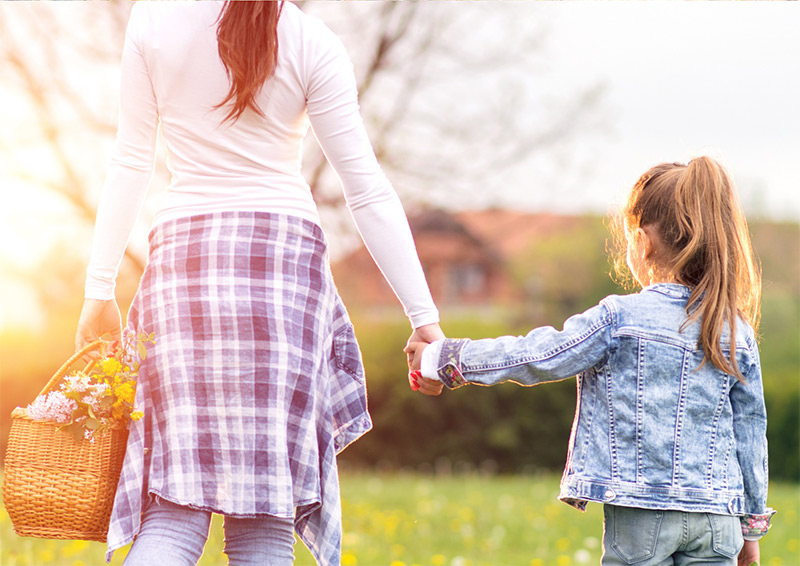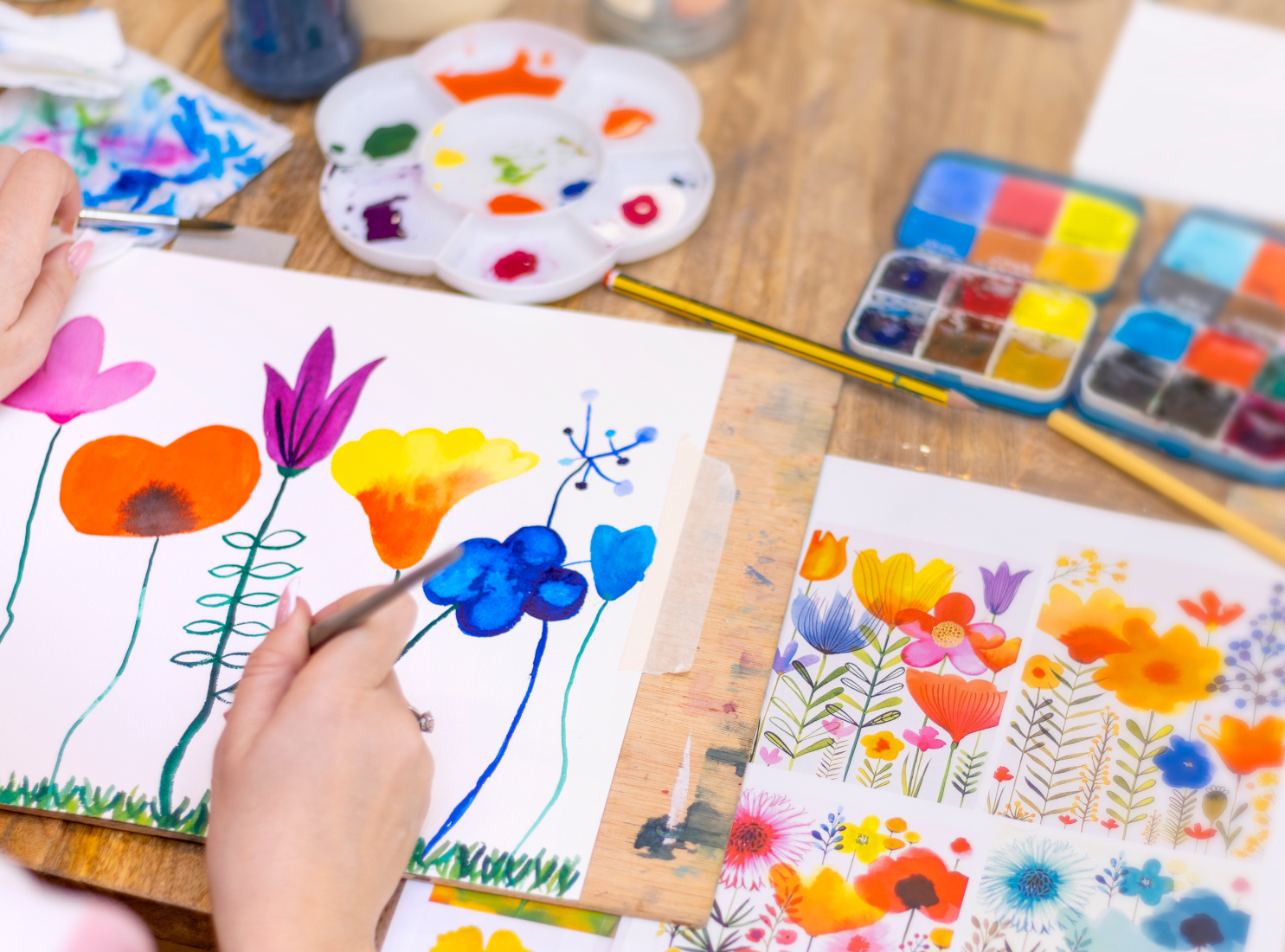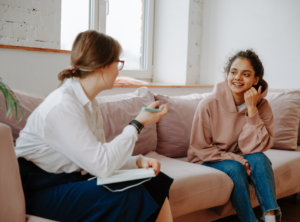Our Services
Children’s Outreach Service

We support children aged 5 to 11 years who are or have been affected by domestic abuse. NIDAS offers support to children to talk about and understand their experiences of domestic abuse in a safe and confidential space.
How can we help?
- One to one support (6 x 45-minute sessions)
- Group sessions (6 x 1-hour sessions)
One-to-one sessions support children to:
- Understand their feelings and emotions
- Learn how to keep themselves safe
- Learn about kind and unkind behaviours
- Learn how to manage anger
- Learn how to cope with worries
- Build confidence and resilience
*Final support session is tailored to meet the individual needs e.g., relaxation / confidence
For referrals, please fill out the form NIDAS referral form CYP and send it to [email protected]
Teen Outreach Service
We support young people aged between 12 to 25 years old who have been affected by domestic abuse within the family or their own intimate relationships. NIDAS offers practical and emotional support to help young people understand their experiences in a safe and confidential environment.
How can we help?
- One to one support (7 x 1-hour sessions)
- Group work
One-to-one sessions support young people to:
- Understand domestic violence and abuse
- Understand what a healthy relationship should look and feel like
- Understand their feelings and emotions
- Develop positive coping strategies
- Develop their communication skills
- Learn how to keep themselves safe
- Access sexual health advice and support (*C- Card trained)
For referrals, please fill out the form NIDAS referral form CYP and send it to [email protected]

Family Service
We offer practical and emotional support to help women understand how domestic abuse may have affected them, their relationships and their family dynamics.

How can we help?
- One to one support sessions (6-8 1hr sessions)
- Group Work e.g. The Freedom Programme and Power to Change
Our outreach workers can provide advice and information around:
- Safety
- Housing
- Welfare benefit options
- Legal options
- Reporting incidents to the police
- How to collect evidence and log incidents
- Accessing other relevant support services, e.g. Citizens Advice or mental health services.
One-to-one sessions support survivors to:
- Understand more about domestic violence and abuse
- Understand what a healthy relationship looks like
- Understand the impact of domestic abuse on children and young people
- Recognise coercive and controlling behaviours
- Understand how to keep themselves and their families safe
- Identify warning signs of abuse
- Promote confidence and self-esteem
- Understand how domestic abuse may have impacted them as a parent
- Understand how domestic abuse can have an impact on family dynamics
- Understand the impact of domestic abuse on children and young people
- Feel more confident to implement boundaries and rebuild family relationship

Psychotherapy Service
All NIDAS Therapists will work in a trauma-informed way, and we have a range of Psychotherapy available to access depending on individual needs, experiences and levels of engagement. .
The 1-1 therapy sessions will have the following impact:
- Increase in self-esteem and development of self-awareness
- To enable individuals to recover from the effects of trauma caused by domestic abuse
- Increase in emotional resilience
- Increased pro-social behaviours and reduction of conflict and challenging behaviour
- Giving individuals a voice when finding words can be difficult.
We can support with:
- Self-esteem/ confidence
- Identity
- Depression
- Anxiety
- Trauma
- Attachment
- Loss/ Bereavement
- Isolation
- PTSD / C-PTSD
- Life skills / Personal development
- Self-Harm
- Suicidal thoughts
Therapy can be:
Client-led; focused weekly on what the client brings with them, starting either with a discussion or expressive artwork, giving the client opportunity to work through what they are struggling with and try to understand, process, or sit comfortable with it.
Directed; the therapist brings the session focus each week, centred on the therapy aims and what was discussed in the assessment session. Artwork themes directed to focus on what the therapy is working towards and supporting the client through the process.

For referrals, please fill out the form NIDAS Referral Form for Adults and send it to [email protected]
Art Therapy
What is Art Therapy?
A form of psychotherapy that uses art as a way of communicating and expressing thoughts, feelings, and emotions. It can help people work through life experiences that they may find difficult to put into words. The process is guided by an art therapist who supports the art-making experience and helps the client to find meaning along the way.
The art therapy process can help you gain insight into your relationship with others, as well as gaining a deeper insight and understanding about yourself. You can explore the ways in which you relate to others and the world around you to understand your everyday life.
Do you have to be good at art?
No! Not at all. This is a common misconception that people worry about. Art Therapy is for everyone with any level of artistic skill. The process and creation of an image, picture or object can help make sense of thoughts and feelings, which is just as important as the final art piece. All artwork is valued in Art Therapy.
For when words are not enough
Art Therapy can help you explore a range of psychological, emotional and social difficulties including enduring, long-term struggles or recent experiences that are affecting your everyday life.
The art therapy process can help you gain insight into your relationship with others, as well as gaining a deeper insight and understanding about yourself. You can explore how you relate to others and the world around you to understand your everyday life.
Having a safe space to be creative and expressive can help you to process your everyday life stresses as well as struggles relating to education or work.
Art therapy is a process of ‘drawing from within’ as it asks you to explore your inner experiences, feelings, perceptions and imagination. The process is guided by an art therapist who supports the art-making experience and helps the client to find meaning along the way
Dyadic Therapy
This is a joined-up approach to therapy, involving children and their parents or carers. Parent/Carer/Child Dyadic Therapy sessions offer a number of therapeutic benefits, such as enhancing caregiving sensitivity, understanding and atonement, enhancing caregiver insight into impact of their own history on their parenting, facilitating joint engagement activities and reflective conversations between caregiving and child, and co-constructing shared narratives and enhancing child’s affect recognition and regulation.
EMDR
EMDR (Eye Movement Desensitisation and Reprocessing) is effective, innovative and well supported by research evidence for treating individuals with symptoms accompanying PTSD, attachment issues, dissociation, and self-regulation. It can also be effective in treating symptoms related to guilt, anger, depression, and anxiety, which are often symptoms displayed by Children and Young People that have been affected by domestic abuse. EMDR can help build emotional resources such as confidence, resilience and self-esteem. EMDR is often used in combination with art therapy.
* Please note, we are unable to support anyone who is already receiving any type of therapeutic support.
If you need urgent support, please contact your GP or call NHS 111 for emergency care. You can also reach out to the Samaritans by calling 116 123, Mind on 0300 123 3393, or SANEline on 0300 304 7000. If you prefer to text, SHOUT offers confidential support 24/7 — simply text SHOUT to 85258. You can also contact your local Mental Health Crisis Team for immediate help.
Humanistic Counselling / Talking Therapy for Adults
What is Humanistic Counselling and Psychotherapy?
The humanistic approach, also known as ‘Talking Therapy’ is about free will, self-discovery and achieving your full potential as a human being, rather than concentrating on individual problems or symptoms. It looks at everything that makes you who you are and focuses on you as a unique individual and your relationship with the world around you.
The therapy is client-led, so your counsellor will work with you on the issues you want to explore. They’ll help you think about your feelings and take responsibility for your thoughts and actions. Your therapy may be short or long-term, depending on your needs.
A counsellor will not give you their opinions or advice or prescribe medication. They will help you find your own solutions – whether that’s making effective changes in your life or finding ways of coping with your problems.
How can we help?
The humanistic approach works on the concept that human nature is inherently good, and everyone has the potential to find answers to their problems.
The relationship between you and your counsellor is vital so you feel able to be fully transparent, explore your feelings and speak openly. Your counsellor offers you empathy, congruence – where they are open and authentic, and unconditional positive regard – where your counsellor accepts you as you are.
Most counselling takes place in planned, regular sessions which last for around 50 minutes. How often you see your counsellor and how many appointments you have will depend on your circumstances, and will be agreed between you and your counsellor.
If you need urgent support, please contact your GP or call NHS 111 for emergency care. You can also reach out to the Samaritans by calling 116 123, Mind on 0300 123 3393, or SANEline on 0300 304 7000. If you prefer to text, SHOUT offers confidential support 24/7 — simply text SHOUT to 85258. You can also contact your local Mental Health Crisis Team for immediate help.

Counselling supports with:
What you talk about will vary depending on what you want help with. It could include:
-
- your relationships
- your feelings, emotions or thoughts
- your behaviour
- past and present life events
- situations you find difficult.
Awareness Training
Domestic violence is a crime. We can all be affected by domestic abuse and we all have a responsibility to speak out against it. At NIDAS we believe it is vital to know how to recognise domestic abuse and understand how to manage disclosures.
Our awareness training aims to:
- Increase professionals confidence in handling a disclosure
- Increase knowledge of support services available to victims of domestic abuse
Our training covers the following:
- Defining domestic abuse
- Signs and symptoms of domestic abuse
- Managing disclosures and support interventions
We can deliver training which is customised to your workplace or organisation, at a cost . If you are interested, please contact us on 01623 683 250 or at [email protected] to discuss this further.

Domestic Abuse Recovering Together (DART)
Helping children and mothers after domestic abuse
Through Domestic Abuse, Recovering Together (DART) children and mothers can talk to each other about domestic abuse, learn to communicate and rebuild their relationship.
Over ten weeks, mothers and children aged 7-14 meet for a weekly two-hour group session.
Children and mothers work together for an hour at the start of the group, then take part in activities in separate groups. At the end of each session, they join together again.
To find out more about the DART programme, download our information leaflet here
NOTE: We are not taking referrals for this until further notice.

Wellbeing Groups

Wellbeing is another way to describe your mental health; how you feel, how you cope day to day, how in control you feel and how satisfied you are with your life. It is more than just being happy or content.
Each of us has our own sense of well-being. One person’s sense of well-being may differ from another’s.
To maintain good mental health, we want to aim for good wellbeing. But what does that actually mean and what areas should we look to nurture?
- Physical Health
- Emotions
- Relationships
- Employment
- Resilience
- Finances
- Thoughts
If you find yourself struggling in any or all these areas, it’s likely to have a negative impact on your mental health. It can be overwhelming trying to address all of them, but many of them are connected and changes in one area can result in changes in another.
As part of this project NIDAS will be delivering monthly wellbeing groups within the community of Mansfield and Ashfield. Each session will focus on a different aspect of wellbeing including activities, workshops, guest speakers and much more!
Group Programmes
The Freedom Programme
Our 10-week Programme helps women learn more about the reality of domestic abuse. We examine the role, attitudes, and beliefs of a perpetrator, as well as the responses of victims and survivors. The aim is to help victims of domestic abuse make sense of and understand what has happened to them. The Freedom Programme also describes in detail how children are affected by being exposed to this kind of abuse, and how their lives are improved when the abuse is removed.
Our trained facilitators will ensure vital measures are in place to make sure those who choose to join us feel safe and supported throughout the duration of the Programme. The Programme consists of two hourly group sessions on a weekly basis and is usually delivered within term time.
To find out more about our upcoming Programmes, please click here.
Power to Change
Power to Change offers a safe space for women who have experienced domestic abuse. The programmes aim to help women develop an understanding of their experiences and offer the development of skills, which they can implement to support them in improving well-being, implementing boundaries within relationships and reducing shame, stigma and guilt.